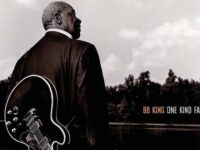 This is an updated excerpt from a multi-artist piece I had published as part of the statewide Louisiana Folklife Festival’s program book in 1995. Thomas suffered a fatal heart attack later that same year, in his hometown of Shreveport, La., ending a career that spanned seven decades:
This is an updated excerpt from a multi-artist piece I had published as part of the statewide Louisiana Folklife Festival’s program book in 1995. Thomas suffered a fatal heart attack later that same year, in his hometown of Shreveport, La., ending a career that spanned seven decades:
On his old records, Jesse “Baby Face” Thomas is a whispering recollection of all that is desired and feared, of human longing. And he’s a darn fine picker, too.
Born around the turn of the century, this Shreveport, La., resident was making records as early as 1927, years before Delta blues innovator Robert Johnson and his musical heir Muddy Waters.
His “Rolling Stone Blues,” in fact, prefigures Waters’ similar and more famous tune. From the renowned 1929 recording of “Blue Goose Blues,” Thomas is revealed as a singer of signature depth, and a guitar player of uncommon complexity.
Like his contemporary Blind Lemon Jefferson, Thomas learned initially by playing and by listening to family and friends, not from records. (Even Robert Johnson had had records to learn from.) But later, and very importantly, Thomas studied music and theory out in California, and he became one of the first prominent black musicians who could read blues music. It was during this period that Jesse sat in with T Bone Walker and Nat “King” Cole, long before either recorded.
 Thomas’s most important early innovation was the practice of bending notes, a thing we’ve become used to in rock music.
Thomas’s most important early innovation was the practice of bending notes, a thing we’ve become used to in rock music.
“He wanted to make it sound like a saxophone,” says playing partner Dan Garner of Shreveport, a reflection of Jesse’s cool mixing of blues and jazz.
Though it’s true that both B.B. King and Roy “Book” Binder have covered his material, it is Thomas’s own unmistakable joyous twang rather than any single song which represents his benchmark in the blues. It is “a very frustrating benchmark,” as Garner says. “The progressions are very simple, but he’s doing all this intricate finger picking.”
At 84, Thomas remained a vital, innovative performer, an elder statesmen in the history of Louisiana’s contribution to the blues. In fact, he issued a terrific remake of “Blue Goose Blues” in 1995, the very year of his passing.
- How Deep Cuts on ‘Music From Big Pink’ Underscore the Band’s Triumph - July 31, 2023
- How ‘Islands’ Signaled the Sad End of the Band’s Five-Man Edition - March 15, 2022
- The Band’s ‘Christmas Must Be Tonight’ Remains an Unjustly Overlooked Holiday Classic - December 25, 2016



